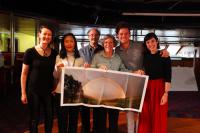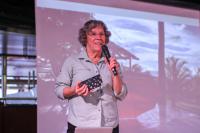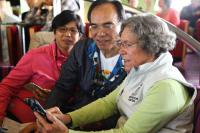Amory and Judy Lovins: Envisaging a World which is Thriving, Verdant and Secure , Feb 27, 2017
Amory Lovins and Judy Hill Lovins live in the Rocky Mountains in Colorado, US, 2200 metres above sea level. Affectionately referred to as “the banana farm” by the pair—after the tropical fruits grown in their greenhouse—their home is the embodiment of their shared values: to use energy efficiently, reduce one’s carbon impact on the planet, and live in harmony with nature. Peace Boat participants listened in awe as the couple described the long list of energy-saving technologies which feature in their “combustion-free” house: 16-inch thick walls which eliminate the need for any heating; “super windows” containing microscopically thin layers of gases which let in light but prevent heat leakage; solar panels on the roof which produce their electricity; and super-efficient appliances such as dishwashers and fridges which save energy.
 The Lovinses pose for a photo with Peace Boat staff and volunteers after one of Judy Hill Lovins’ photography workshops.
The Lovinses pose for a photo with Peace Boat staff and volunteers after one of Judy Hill Lovins’ photography workshops.
In his first lecture on Peace Boat, Amory Lovins—co-founder and Chief Scientist of the Rocky Mountain Institute and one of the world’s foremost experts on renewable energy—persuasively made the case for transitioning from oil to renewable energy sources. Sharing research and statistics produced by his “think-and-do tank”, he illustrated how efficient energy use and renewable energy production are not only imperative to protect the environment, but also economically advantageous. In 1975, the US government insisted that the energy required to make a dollar of GDP could never go down. Since then it has decreased by 55 per cent in 40 years, in line with Lovins’ prediction. That reduction is in part due to the “integrative design” developed by Lovins and his team. Optimizing vehicles, buildings, and factories as whole systems, not isolated components, Lovins explains, can often make big energy savings cost less than small or no savings, turning diminishing returns into expanding returns.
 Amory Lovins explains the economic case for closing all nuclear power stations in his second lecture onboard.
Amory Lovins explains the economic case for closing all nuclear power stations in his second lecture onboard.
Closing nuclear power plants to save money, reduce carbon emissions, and minimize risk is also a must, according to Lovins. In his second lecture, he described how Japan’s energy monopolies and the government’s protectionist policies have prevented renewable power from competing with fossil fuel and nuclear stations. Using data from European countries, China and the US, Lovins demonstrated how the decline of nuclear energy is inevitable based on economic principles, and that the transition to renewable energy sources will also lead to enhanced social and environmental benefits, as well as geopolitical stability—essential to the achievement of the UN Sustainable Development Goals. “If we focus on outcomes and not motives, we can achieve results that we all want, but for different reasons, without gridlock and conflict. We can turn energy into a unifying source of social cohesion and order,” observed Lovins, astutely. Komatsu Masumi, a Peace Boat participant who attended both lectures shared her thoughts: “Japan has the technology to harness its renewable energy resources; I hope more Japanese people will become aware of the benefits of renewable energy and demand this transition soon.”
 Amory Lovins takes part in an interview onboard regarding his contribution to Peace Boat’s Ecoship project.
Amory Lovins takes part in an interview onboard regarding his contribution to Peace Boat’s Ecoship project.
As a fine art landscape photographer with over 40 years of experience, Judy Hills Lovins shares her husband’s deep appreciation of the natural world. With her expansive, vibrant photographs which capture the fragile beauty of nature, she offers people the opportunity to enjoy the great outdoors even when indoors. While travelling on Peace Boat, she held a series of interactive workshops geared towards honing one’s mobile phone photography skills. “The best camera is the one you have with you—and most of you always have a mobile phone with you,” Lovins exclaimed.
 Judy Hill Lovins demonstrates how to take cell phone pictures like a professional in one of her workshops onboard.
Judy Hill Lovins demonstrates how to take cell phone pictures like a professional in one of her workshops onboard.
During the workshops, participants learned the basics of good composition and lighting—both fundamental elements in all types of photography. They also received tips on how to maximize the quality of their mobile phone photographs, for example by using accessories such as a mini tripod, and by editing photographs using specialized mobile phone applications. Her expert knowledge came just in time for the two-day expedition to Antarctica, during which participants had the opportunity to apply their new-found skills in enchantingly beautiful landscapes. Although their time on the boat was limited, the Lovinses were able to impart a wealth of knowledge which participants could reflect upon and apply to their daily lives.
 Judy Hill Lovins teaches 2 Peace Boat participants from Taiwan some clever photography tricks.
Judy Hill Lovins teaches 2 Peace Boat participants from Taiwan some clever photography tricks.